Unit 2 Bridging Cultures Learning about Language(课件)-高二英语同步高效课堂(人教版2019选择性必修第二册)
文档属性
| 名称 | Unit 2 Bridging Cultures Learning about Language(课件)-高二英语同步高效课堂(人教版2019选择性必修第二册) | 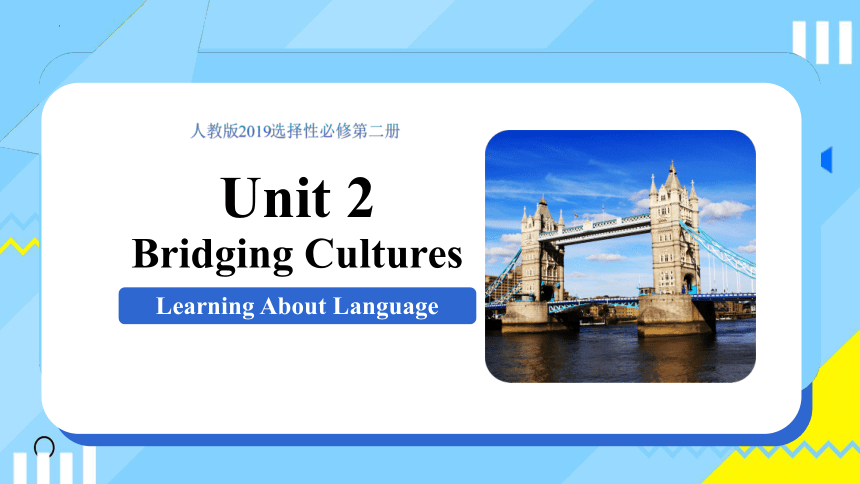 | |
| 格式 | pptx | ||
| 文件大小 | 4.5MB | ||
| 资源类型 | 试卷 | ||
| 版本资源 | 人教版(2019) | ||
| 科目 | 英语 | ||
| 更新时间 | 2024-10-30 13:56:47 | ||
图片预览

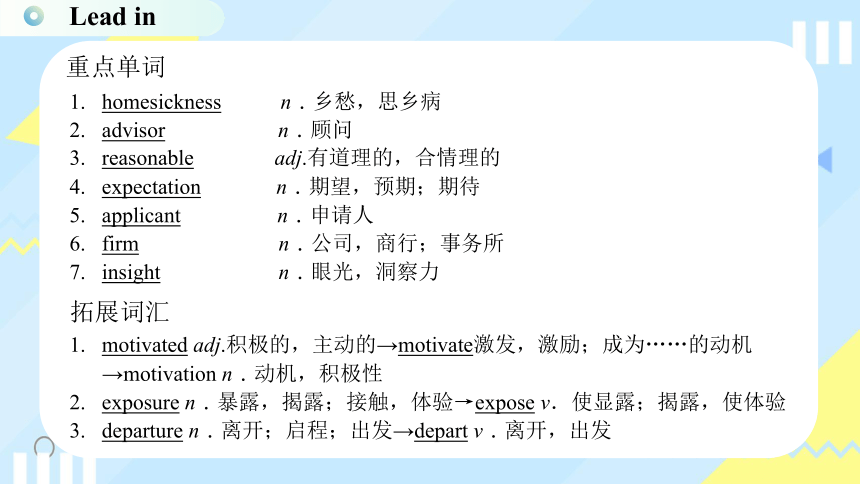
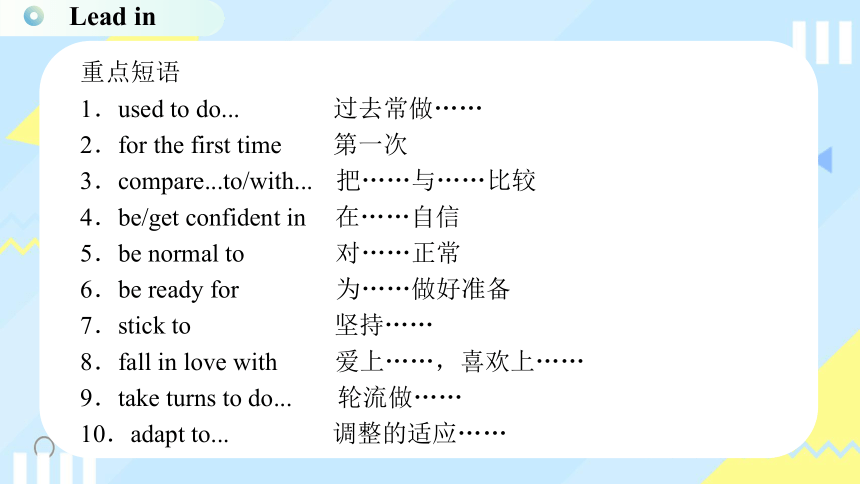
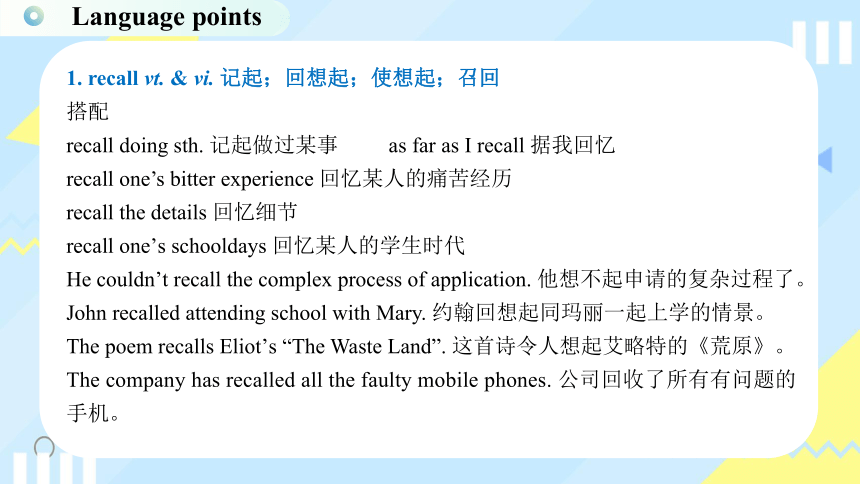
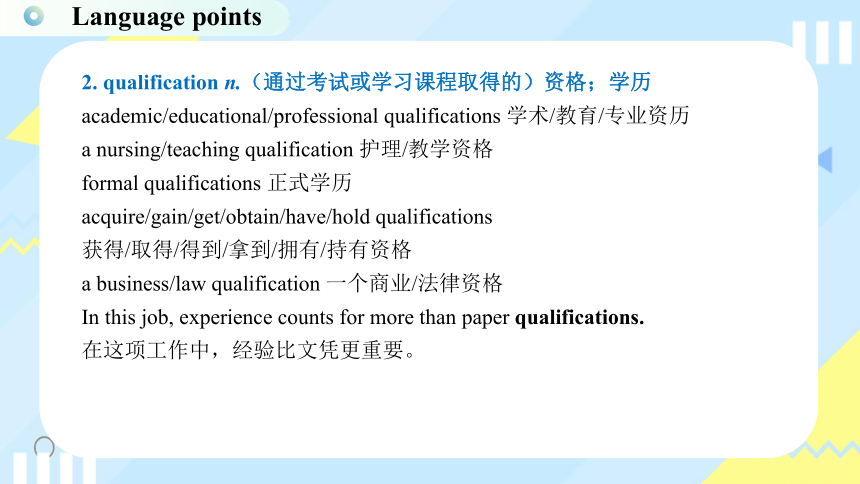

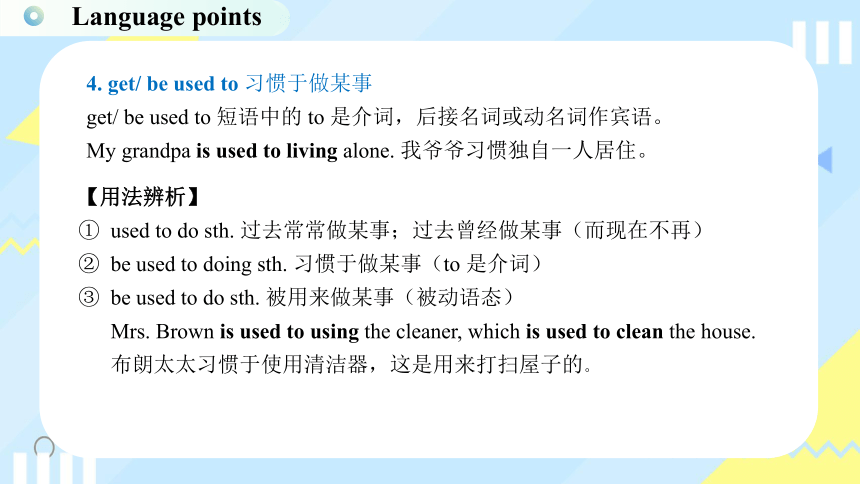
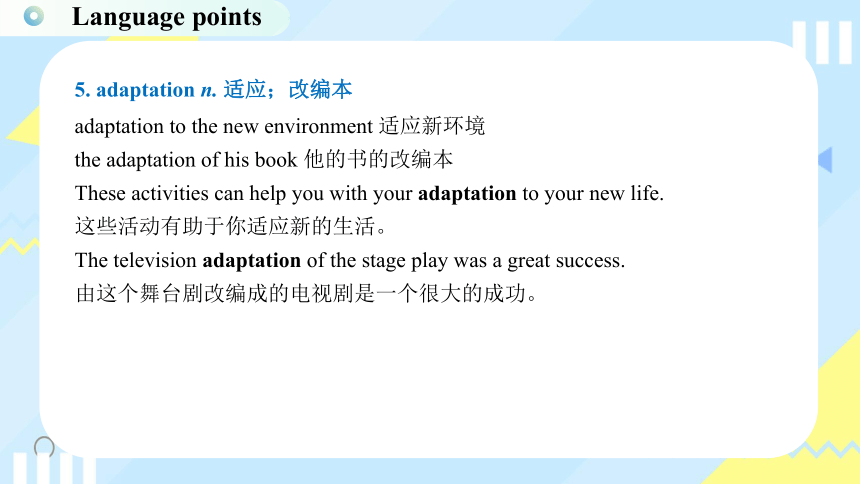
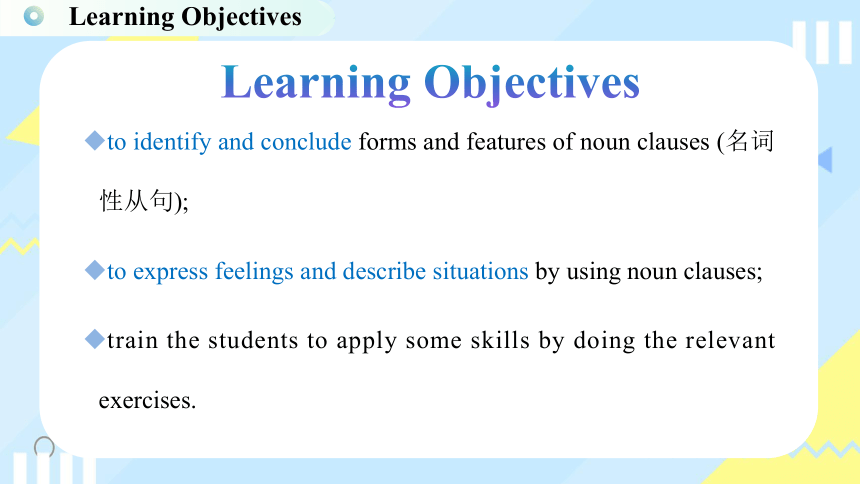
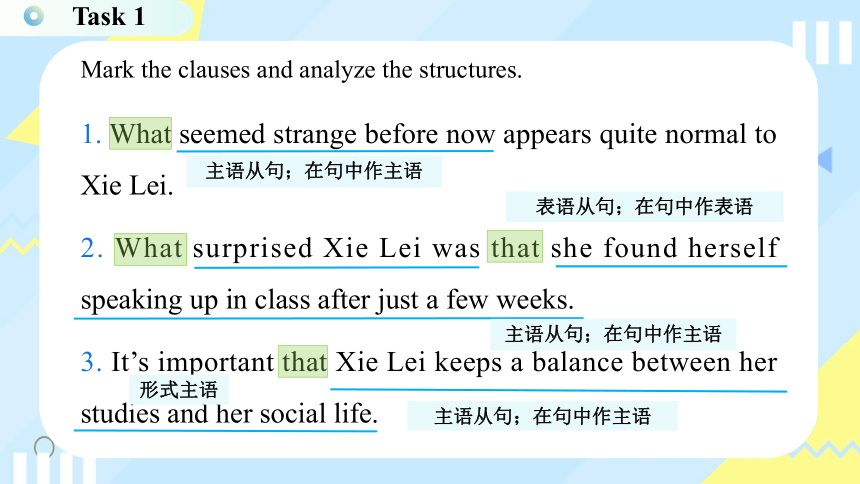
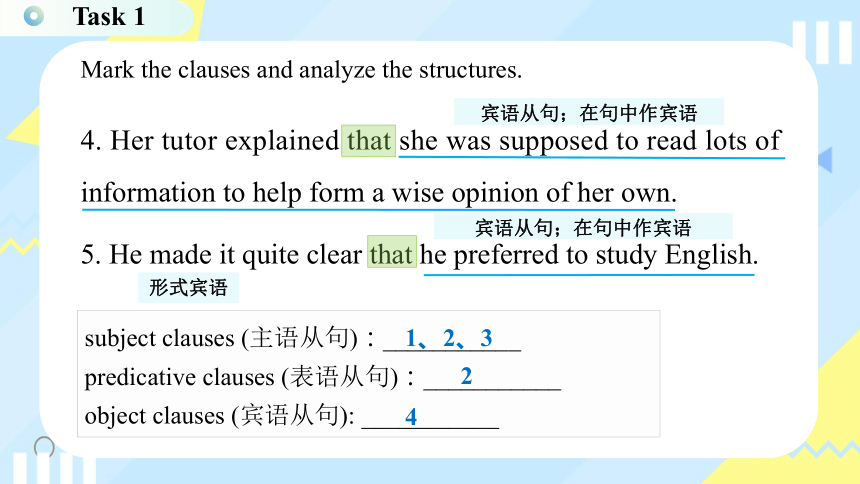
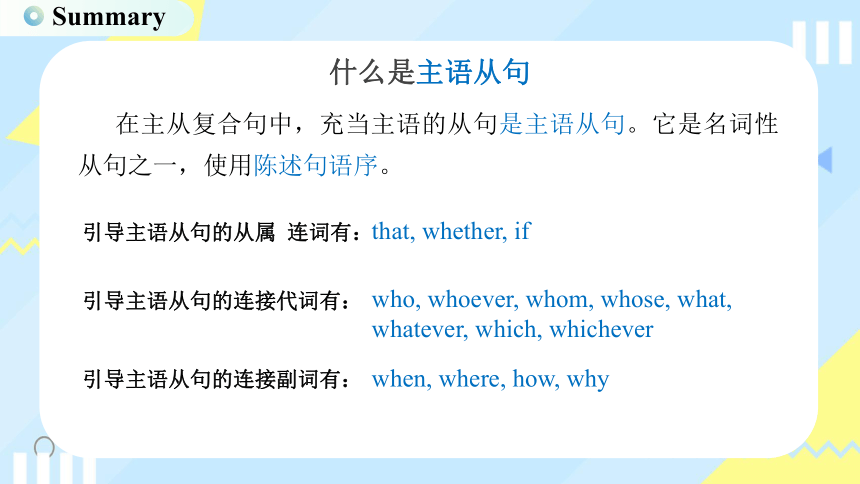
文档简介
(共42张PPT)
Unit 2
人教版2019选择性必修第二册
Bridging Cultures
Learning About Language
Lead in
重点单词
homesickness n.乡愁,思乡病
advisor n.顾问
reasonable adj.有道理的,合情理的
expectation n.期望,预期;期待
applicant n.申请人
firm n.公司,商行;事务所
insight n.眼光,洞察力
拓展词汇
motivated adj.积极的,主动的→motivate激发,激励;成为……的动机→motivation n.动机,积极性
exposure n.暴露,揭露;接触,体验→expose v.使显露;揭露,使体验
departure n.离开;启程;出发→depart v.离开,出发
Lead in
重点短语
1.used to do... 过去常做……
2.for the first time 第一次
3.compare...to/with... 把……与……比较
4.be/get confident in 在……自信
5.be normal to 对……正常
6.be ready for 为……做好准备
7.stick to 坚持……
8.fall in love with 爱上……,喜欢上……
9.take turns to do... 轮流做……
10.adapt to... 调整的适应……
Language points
1. recall vt. & vi. 记起;回想起;使想起;召回
搭配
recall doing sth. 记起做过某事 as far as I recall 据我回忆
recall one’s bitter experience 回忆某人的痛苦经历
recall the details 回忆细节
recall one’s schooldays 回忆某人的学生时代
He couldn’t recall the complex process of application. 他想不起申请的复杂过程了。
John recalled attending school with Mary. 约翰回想起同玛丽一起上学的情景。
The poem recalls Eliot’s “The Waste Land”. 这首诗令人想起艾略特的《荒原》。
The company has recalled all the faulty mobile phones. 公司回收了所有有问题的手机。
Language points
2. qualification n.(通过考试或学习课程取得的)资格;学历
academic/educational/professional qualifications 学术/教育/专业资历
a nursing/teaching qualification 护理/教学资格
formal qualifications 正式学历
acquire/gain/get/obtain/have/hold qualifications
获得/取得/得到/拿到/拥有/持有资格
a business/law qualification 一个商业/法律资格
In this job, experience counts for more than paper qualifications.
在这项工作中,经验比文凭更重要。
Language points
3. ambition n. 追求的目标;夙愿;野心;抱负
one’s ambition is to do sth. 某人的理想是做某事
have an ambition to do sth./ of doing sth. 有做……的愿望
搭配
realise/achieve/fulfill one’s ambition 实现某人的抱负
be full of ambition 满腹雄心
burn with an ambition 野心勃勃
Although disabled, he has always had an ambition to be an astronaut.
尽管身有残疾,但他一直渴望当宇航员。
The novelist was determined to achieve his ambition.那位小说家下定决心要实现自己的抱负。
Language points
4. get/ be used to 习惯于做某事
get/ be used to 短语中的 to 是介词,后接名词或动名词作宾语。
My grandpa is used to living alone. 我爷爷习惯独自一人居住。
【用法辨析】
used to do sth. 过去常常做某事;过去曾经做某事(而现在不再)
be used to doing sth. 习惯于做某事(to 是介词)
be used to do sth. 被用来做某事(被动语态)
Mrs. Brown is used to using the cleaner, which is used to clean the house.
布朗太太习惯于使用清洁器,这是用来打扫屋子的。
Language points
5. adaptation n. 适应;改编本
adaptation to the new environment 适应新环境
the adaptation of his book 他的书的改编本
These activities can help you with your adaptation to your new life.
这些活动有助于你适应新的生活。
The television adaptation of the stage play was a great success.
由这个舞台剧改编成的电视剧是一个很大的成功。
Learning Objectives
to identify and conclude forms and features of noun clauses (名词性从句);
to express feelings and describe situations by using noun clauses;
train the students to apply some skills by doing the relevant exercises.
Learning Objectives
Task 1
Mark the clauses and analyze the structures.
1. What seemed strange before now appears quite normal to Xie Lei.
2. What surprised Xie Lei was that she found herself speaking up in class after just a few weeks.
3. It’s important that Xie Lei keeps a balance between her studies and her social life.
主语从句;在句中作主语
主语从句;在句中作主语
表语从句;在句中作表语
主语从句;在句中作主语
形式主语
Task 1
Mark the clauses and analyze the structures.
4. Her tutor explained that she was supposed to read lots of information to help form a wise opinion of her own.
5. He made it quite clear that he preferred to study English.
subject clauses (主语从句):___________
predicative clauses (表语从句):___________
object clauses (宾语从句): ___________
形式宾语
宾语从句;在句中作宾语
宾语从句;在句中作宾语
1、2、3
2
4
Summary
什么是主语从句
在主从复合句中,充当主语的从句是主语从句。它是名词性从句之一,使用陈述句语序。
引导主语从句的从属 连词有:
引导主语从句的连接代词有:
引导主语从句的连接副词有:
that, whether, if
who, whoever, whom, whose, what, whatever, which, whichever
when, where, how, why
Summary
主语从句
复合句中用作主语的从句叫作主语从句
含义
注意
语序问题: 陈述语序(主语+谓语)
主谓一致问题
it作形式主语的句型:
It + be +形容词+ that从句
It + be +名词(词组) + that从句
It + be +过去分词+ that从句
It +不及物动词(短语) + that从句
Summary
“缺什么补什么”原则
缺主语,指人用____,指物用_____
缺时间状语用______;
地点状语用______;
原因状语用_____;
方式状语用_____;
定语用____________;
什么都不缺用_______,缺“是否”_______
who
what
when
where
why
how
which/whose
主语从句的连接词
that
whether
缺宾语,指人用 ,指物用____
who/whom
what
Summary
探寻规律1:主语从句 主谓一致 问题
Whether the patient will be taken ______ unknown.
When and where the patient will be taken _____ unknown.
When the task can be finished and whether he can have a rest _____ unknown.
What he wants most ____ staying with his family.
What they need _______ masks(口罩).
is
单个从句做主语,谓语大多数使用_______(单数?复数?)
单数
由两个连接词引导同一个主从,谓动使用____(单数?复数?)
单数
主语为and连接的两个主从时,谓动使用____(单数?复数?)
复数
what在主从中做宾语时,谓语的单复数取决它后面的表语。
are
is
are
is
陈述语序
陈述语序
★主语从句一律用__________即主语在前,谓语在后。
陈述语序
Summary
表语从句
复合句中用作表语的从句叫作表语从句
含义
连接词
从属连词、连接代词、连接副词
whether一般不能用if替换
其他连接词:as though/if, because
注意
特殊句式
as if/ though引导的表语从句的语气
Summary
as if/ though 虚拟语气的用法
与现在事实相反
与过去事实相反
与将来事实相反
从句谓动:一般过去时(be只能用were)
从句谓动:过去完成时(had done)
从句谓动:would/could/might+动原
Summary
表语从句中的特殊句式
① The reason why...is/was that... ……的原因是……
② This/That/It is because... 这/那是因为……
③ This/That/It is why... 这/那就是……的原因
Summary
Attributive Clause
(定语从句)
Noun Clause
(名词性从句)
Adverbial Clause
(状语从句)
主从复合句
主语从句
表语从句
宾语从句
同位语从句
Contents
Contents
1.宾语从句的定义
2.宾语从句的引导词
3.宾语从句的时态
4. it作形式宾语
5.总结
Study the rules
I know him.
2. I know that he likes maths.
主语
谓语
宾语
(简单句)
主语
谓语
从句主语
连词
什么是宾语从句?
宾语从句的结构是什么?
(宾语从句)
从句谓语
从句宾语
Task 1. Observe and find out the Objects in the following sentences.
主语+谓语+连词(引导词)+ 宾语从句
We wonder how we shall do.
I don’t know that it can be fake.
I worry about whether he can pass the exam.
Pay attention to what the doctor said.
Study the rules
Task 2. Read the following sentences and try to underline the object clauses.
Conclusion:
宾语从句多位于_______________的后面。
及物动词或介词
Study the rules
从属连词 that, whether, if 等 只起连接作用,不在从句中作任何成分
连接代词 what, who, whom, which, whatever, whoever, whomever, whichever等 在从句中作主语、宾语、表语等
连接副词 when, where, why, how等 在从句中作状语
2.宾语从句的引导词
怎样选择引导词?
Study the rules
2.1从属连词
连接词 that 在宾语从句中不充当成分,没有词义,通常可以省略。
We think(that) he will help us.
连接词if/whether 在宾语从句中不充当成分,意为“是否”,whether,if 可以互换
I wonder whether/if it is true.
She asked if/whether it is enough.
1.
2.
Study the rules
that引导宾语从句时,下列情况下that不能省略:
1.
2.
动词后有多个that引导的宾语从句时,只有第一个that可省略其余的that不可省略。
He said (that) the book was very interesting and that all the children like to read it.
在it作形式宾语时,that 引导宾语从句中的that 大多不可省略,即:主+谓+it(形式宾语)+宾补+that从句.
We made it clear that we would not give in.
Study the rules
只能用whether,不能用 if 的情况
在介词后面
在动词不定式前(whether to do sth)
当与or not 连用时
1.I don’t know it is true or not.
2.I can’t decide to accept his invitation.
3.I worry about I hurt her feelings.
4. I asked her __________ she had a bike.
whether
whether
whether
whether/if
Study the rules
2.2/2.3 连接代词/连接副词
连接代词:
连接副词:
who, whom, whose, which, what
where, how, why, when
以上连接词引导宾语从句,在从句中充当成分,具有一定的意义,不能省略。
(主、宾、表、定语)
(状语)(根据句意判断)
1.I don’t know answer I should choose.
2.The teacher asked could answer the question.
3.I wonder we will have a meeting.
which
who
when
Study the rules
3.宾语从句的时态
1.当主句是 一般现在时,宾从根据实际情况使用任何时态。
The headmaster hopes that everything ( go) well.
I don’t think it ( rain ) tomorrow.
2.当主句是 一般过去时,宾从用过去的某种时态。
He said that he (be) worried about his son.
3.当从句表示的是一个客观真理或者不变的事实时,宾从用一
般现在时。
The teacher told us that light (travel) faster than sound.
goes
will rain
was
travels
主过从过,主现从任,客观一般
Yesterday, he said that he (finish) his homework.
had finished
Practice
The radio says it _______(be) cloudy tomorrow.
The headmaster hopes everything ______(go) well.
I heard they ____________(return) it already.
Our teacher told us in class the sun _______(rise)
in the east.
will be
goes
had returned
rises
Fill in the proper form of the words given
Study the rules
4. It作形式主语/宾语
_____is hard to decide when and where we will hold our sports meeting.
We find _______ necessary that we practise spoken English every day.
I have made _______ a rule that I keep a diary every day.
It
it
后置
it作形式宾语句型:
主语 + vt.(find/ feel/ think/ consider/ make/ believe)+ it + 宾补(形容词和名词)+ that/ wh- …
it
1.
2.
当主语从句较长,而谓语较短时,常常将从句______,而用it作为形式主语置于句首。it也可作形式宾语。
Summary
宾语从句的三要素
引导词
从属连词→
连接代词→
连接副词→
语序
时态
主句 — 过去时 →
主句 — 现在时 →
陈述句语序
That/ if / whether
who, whom, whose, what, which 等
(只能用whether的情况)
when, where, how, why
(从句的构成:主语+谓语+连词(引导词)+ 宾语从句)
从句 — 任何时态
从句 — 过去类时态
从句 — 客观事实,格言,谚语 → 一般现在时
Practice
用适当的引导词完成下面练习。
1. _________ he has is an empty room.
2. _________ he has come back is known to all.
3. He didn’t tell me ________ he went yesterday.
4. _____________ he will go to France has not been decided yet.
5. No one knows _________ will be the next president.
6. The shy girl asked _____________ she could have a look at the present.
7. He expressed his wish to me _________ he could go to Canada to study.
What
That
where
Whether/When
who
whether/if
that
主语从句,what作has的宾语
主语从句,that不作成分
宾语从句,where作状语
主语从句,whether表是否,when作状语
宾语从句,who作主语
宾语从句,whether/if表是否
同位语从句,that不作成分
Observe and Discover
I have no idea
when he will get married.
how they can get the treasure.
where the concert will be held.
who is fit for the work.
why it happened.
which pen is mine.
what we should do next.
whom they are talking about.
whether it’ll rain tomorrow.
that our football team won the game.
Appositive Clause
Observe and Discover
1. I heard the news that we would have two days off this week.
2. There is some doubt whether he is fit for the job.
3. The question what we should do next is not clear.
4. I have no idea where he has gone.
5. She made a request that we should help her.
Rule 1
在复合句中,同位语从句跟在_______词后面,并对其进行_____________, 即该从句在复合句中充当__________语,意为“即……”。
名
解释说明
同位
Observe and Discover
同位语从句
一般放在fact, news, idea, truth, hope, problem, information, belief, thought, doubt, promise, question等抽象名词的后面,对前面的名词作进一步的解释,或说明前面名词的具体含义。同位语从句通常由that引导,也可以由whether、连接代词或连接副词引导。
1.He gave me some advice ________ I should read English every day.
2.There is some doubt __________ he will come.
3.The question _______ will replace him is still not clear.
4.I have no idea ________ large the physical universe is.
我不知道物质世界有多大。
that
whether
who
how
事实
消息
想法
真相
希望
问题
信息
信念
思想
怀疑
承诺
问题
Observe and Discover
Rule 2
同位语从句的引导词
Usage of its Conjuctions 引导词的使用
从属连词 连接代词 连接副词
that, whether
what, which, who, whom, whose
when, where, how, why
Observe and Discover
The news (that) they told us cheered us all.
The news that they won the competition cheered us all.
考点、同位语从句vs.定语从句
句子类型 名词 与前面名词的关系 连接词 省略
同位语从句
定语从句
抽象名词
名词
同位关系:对名词进行补充说明
所属关系:对名词进行修饰, 加以限定
连接作用,不作成分
连接作用,宾语和主语
that不能省略
宾that可以省略
同位语
定语从句
1. The suggestion ___________he raised at the meeting is very good.
2. The suggestion ____________the students (should) have plenty of
exercise is very good.
(which/that)
that
Observe and Discover
The fact that they won the game pleased all of them.
The news that they told us cheered us all.
Suddenly the thought came to me that he could go blind.
The thought that suddenly came to me is terrible.
(that clause = the fact)
(同位语从句)
(that 指代 the news)
(定语从句)
(同位语从句)
(定语从句)
判断下列各句是同位语从句还是定语从句
Observe and Discover
高考链接
A. that he enjoys being with Chinese people
B. how he can learn to appreciate it more deeply
C. what impressed him first
D. that people can eat almost everything with chopsticks
After just a few months in China, Leon, an exchange student from Germany, says that he has fallen in love with Chinese culture. ____ was the Chinese food. He couldn’t believe how many different kinds of Chinese food there are! Something else he found impressive was ____. Then there’s China’s colourful culture, from art to music, and calligraphy to literature. _____ remains an important goal for him as he is truly fascinated by it. Leon is also amazed by the convenience of cashless payments in China. He can go outside without any need for cash—all he needs is his mobile phone! The biggest reason why he loves China, however, is_____. He has made great friends here—friends that he will still remember long after his departure.
C
D
B
A
Self-evaluation
At the end of the class Evaluation(Circle the marks)
1.Can I use some words freely 5 4 3 2 1
2.Have I grasped the structure of the Noun Clauses 5 4 3 2 1
3.Have I understood the usage of the Noun Clauses 5 4 3 2 1
Total scores
What I need to improve:
Homework
Review what we have learnt.
Do the homework on exercise book.
选做: Make a dialogue using Noun Clauses.
Thank you
Unit 2
人教版2019选择性必修第二册
Bridging Cultures
Learning About Language
Lead in
重点单词
homesickness n.乡愁,思乡病
advisor n.顾问
reasonable adj.有道理的,合情理的
expectation n.期望,预期;期待
applicant n.申请人
firm n.公司,商行;事务所
insight n.眼光,洞察力
拓展词汇
motivated adj.积极的,主动的→motivate激发,激励;成为……的动机→motivation n.动机,积极性
exposure n.暴露,揭露;接触,体验→expose v.使显露;揭露,使体验
departure n.离开;启程;出发→depart v.离开,出发
Lead in
重点短语
1.used to do... 过去常做……
2.for the first time 第一次
3.compare...to/with... 把……与……比较
4.be/get confident in 在……自信
5.be normal to 对……正常
6.be ready for 为……做好准备
7.stick to 坚持……
8.fall in love with 爱上……,喜欢上……
9.take turns to do... 轮流做……
10.adapt to... 调整的适应……
Language points
1. recall vt. & vi. 记起;回想起;使想起;召回
搭配
recall doing sth. 记起做过某事 as far as I recall 据我回忆
recall one’s bitter experience 回忆某人的痛苦经历
recall the details 回忆细节
recall one’s schooldays 回忆某人的学生时代
He couldn’t recall the complex process of application. 他想不起申请的复杂过程了。
John recalled attending school with Mary. 约翰回想起同玛丽一起上学的情景。
The poem recalls Eliot’s “The Waste Land”. 这首诗令人想起艾略特的《荒原》。
The company has recalled all the faulty mobile phones. 公司回收了所有有问题的手机。
Language points
2. qualification n.(通过考试或学习课程取得的)资格;学历
academic/educational/professional qualifications 学术/教育/专业资历
a nursing/teaching qualification 护理/教学资格
formal qualifications 正式学历
acquire/gain/get/obtain/have/hold qualifications
获得/取得/得到/拿到/拥有/持有资格
a business/law qualification 一个商业/法律资格
In this job, experience counts for more than paper qualifications.
在这项工作中,经验比文凭更重要。
Language points
3. ambition n. 追求的目标;夙愿;野心;抱负
one’s ambition is to do sth. 某人的理想是做某事
have an ambition to do sth./ of doing sth. 有做……的愿望
搭配
realise/achieve/fulfill one’s ambition 实现某人的抱负
be full of ambition 满腹雄心
burn with an ambition 野心勃勃
Although disabled, he has always had an ambition to be an astronaut.
尽管身有残疾,但他一直渴望当宇航员。
The novelist was determined to achieve his ambition.那位小说家下定决心要实现自己的抱负。
Language points
4. get/ be used to 习惯于做某事
get/ be used to 短语中的 to 是介词,后接名词或动名词作宾语。
My grandpa is used to living alone. 我爷爷习惯独自一人居住。
【用法辨析】
used to do sth. 过去常常做某事;过去曾经做某事(而现在不再)
be used to doing sth. 习惯于做某事(to 是介词)
be used to do sth. 被用来做某事(被动语态)
Mrs. Brown is used to using the cleaner, which is used to clean the house.
布朗太太习惯于使用清洁器,这是用来打扫屋子的。
Language points
5. adaptation n. 适应;改编本
adaptation to the new environment 适应新环境
the adaptation of his book 他的书的改编本
These activities can help you with your adaptation to your new life.
这些活动有助于你适应新的生活。
The television adaptation of the stage play was a great success.
由这个舞台剧改编成的电视剧是一个很大的成功。
Learning Objectives
to identify and conclude forms and features of noun clauses (名词性从句);
to express feelings and describe situations by using noun clauses;
train the students to apply some skills by doing the relevant exercises.
Learning Objectives
Task 1
Mark the clauses and analyze the structures.
1. What seemed strange before now appears quite normal to Xie Lei.
2. What surprised Xie Lei was that she found herself speaking up in class after just a few weeks.
3. It’s important that Xie Lei keeps a balance between her studies and her social life.
主语从句;在句中作主语
主语从句;在句中作主语
表语从句;在句中作表语
主语从句;在句中作主语
形式主语
Task 1
Mark the clauses and analyze the structures.
4. Her tutor explained that she was supposed to read lots of information to help form a wise opinion of her own.
5. He made it quite clear that he preferred to study English.
subject clauses (主语从句):___________
predicative clauses (表语从句):___________
object clauses (宾语从句): ___________
形式宾语
宾语从句;在句中作宾语
宾语从句;在句中作宾语
1、2、3
2
4
Summary
什么是主语从句
在主从复合句中,充当主语的从句是主语从句。它是名词性从句之一,使用陈述句语序。
引导主语从句的从属 连词有:
引导主语从句的连接代词有:
引导主语从句的连接副词有:
that, whether, if
who, whoever, whom, whose, what, whatever, which, whichever
when, where, how, why
Summary
主语从句
复合句中用作主语的从句叫作主语从句
含义
注意
语序问题: 陈述语序(主语+谓语)
主谓一致问题
it作形式主语的句型:
It + be +形容词+ that从句
It + be +名词(词组) + that从句
It + be +过去分词+ that从句
It +不及物动词(短语) + that从句
Summary
“缺什么补什么”原则
缺主语,指人用____,指物用_____
缺时间状语用______;
地点状语用______;
原因状语用_____;
方式状语用_____;
定语用____________;
什么都不缺用_______,缺“是否”_______
who
what
when
where
why
how
which/whose
主语从句的连接词
that
whether
缺宾语,指人用 ,指物用____
who/whom
what
Summary
探寻规律1:主语从句 主谓一致 问题
Whether the patient will be taken ______ unknown.
When and where the patient will be taken _____ unknown.
When the task can be finished and whether he can have a rest _____ unknown.
What he wants most ____ staying with his family.
What they need _______ masks(口罩).
is
单个从句做主语,谓语大多数使用_______(单数?复数?)
单数
由两个连接词引导同一个主从,谓动使用____(单数?复数?)
单数
主语为and连接的两个主从时,谓动使用____(单数?复数?)
复数
what在主从中做宾语时,谓语的单复数取决它后面的表语。
are
is
are
is
陈述语序
陈述语序
★主语从句一律用__________即主语在前,谓语在后。
陈述语序
Summary
表语从句
复合句中用作表语的从句叫作表语从句
含义
连接词
从属连词、连接代词、连接副词
whether一般不能用if替换
其他连接词:as though/if, because
注意
特殊句式
as if/ though引导的表语从句的语气
Summary
as if/ though 虚拟语气的用法
与现在事实相反
与过去事实相反
与将来事实相反
从句谓动:一般过去时(be只能用were)
从句谓动:过去完成时(had done)
从句谓动:would/could/might+动原
Summary
表语从句中的特殊句式
① The reason why...is/was that... ……的原因是……
② This/That/It is because... 这/那是因为……
③ This/That/It is why... 这/那就是……的原因
Summary
Attributive Clause
(定语从句)
Noun Clause
(名词性从句)
Adverbial Clause
(状语从句)
主从复合句
主语从句
表语从句
宾语从句
同位语从句
Contents
Contents
1.宾语从句的定义
2.宾语从句的引导词
3.宾语从句的时态
4. it作形式宾语
5.总结
Study the rules
I know him.
2. I know that he likes maths.
主语
谓语
宾语
(简单句)
主语
谓语
从句主语
连词
什么是宾语从句?
宾语从句的结构是什么?
(宾语从句)
从句谓语
从句宾语
Task 1. Observe and find out the Objects in the following sentences.
主语+谓语+连词(引导词)+ 宾语从句
We wonder how we shall do.
I don’t know that it can be fake.
I worry about whether he can pass the exam.
Pay attention to what the doctor said.
Study the rules
Task 2. Read the following sentences and try to underline the object clauses.
Conclusion:
宾语从句多位于_______________的后面。
及物动词或介词
Study the rules
从属连词 that, whether, if 等 只起连接作用,不在从句中作任何成分
连接代词 what, who, whom, which, whatever, whoever, whomever, whichever等 在从句中作主语、宾语、表语等
连接副词 when, where, why, how等 在从句中作状语
2.宾语从句的引导词
怎样选择引导词?
Study the rules
2.1从属连词
连接词 that 在宾语从句中不充当成分,没有词义,通常可以省略。
We think(that) he will help us.
连接词if/whether 在宾语从句中不充当成分,意为“是否”,whether,if 可以互换
I wonder whether/if it is true.
She asked if/whether it is enough.
1.
2.
Study the rules
that引导宾语从句时,下列情况下that不能省略:
1.
2.
动词后有多个that引导的宾语从句时,只有第一个that可省略其余的that不可省略。
He said (that) the book was very interesting and that all the children like to read it.
在it作形式宾语时,that 引导宾语从句中的that 大多不可省略,即:主+谓+it(形式宾语)+宾补+that从句.
We made it clear that we would not give in.
Study the rules
只能用whether,不能用 if 的情况
在介词后面
在动词不定式前(whether to do sth)
当与or not 连用时
1.I don’t know it is true or not.
2.I can’t decide to accept his invitation.
3.I worry about I hurt her feelings.
4. I asked her __________ she had a bike.
whether
whether
whether
whether/if
Study the rules
2.2/2.3 连接代词/连接副词
连接代词:
连接副词:
who, whom, whose, which, what
where, how, why, when
以上连接词引导宾语从句,在从句中充当成分,具有一定的意义,不能省略。
(主、宾、表、定语)
(状语)(根据句意判断)
1.I don’t know answer I should choose.
2.The teacher asked could answer the question.
3.I wonder we will have a meeting.
which
who
when
Study the rules
3.宾语从句的时态
1.当主句是 一般现在时,宾从根据实际情况使用任何时态。
The headmaster hopes that everything ( go) well.
I don’t think it ( rain ) tomorrow.
2.当主句是 一般过去时,宾从用过去的某种时态。
He said that he (be) worried about his son.
3.当从句表示的是一个客观真理或者不变的事实时,宾从用一
般现在时。
The teacher told us that light (travel) faster than sound.
goes
will rain
was
travels
主过从过,主现从任,客观一般
Yesterday, he said that he (finish) his homework.
had finished
Practice
The radio says it _______(be) cloudy tomorrow.
The headmaster hopes everything ______(go) well.
I heard they ____________(return) it already.
Our teacher told us in class the sun _______(rise)
in the east.
will be
goes
had returned
rises
Fill in the proper form of the words given
Study the rules
4. It作形式主语/宾语
_____is hard to decide when and where we will hold our sports meeting.
We find _______ necessary that we practise spoken English every day.
I have made _______ a rule that I keep a diary every day.
It
it
后置
it作形式宾语句型:
主语 + vt.(find/ feel/ think/ consider/ make/ believe)+ it + 宾补(形容词和名词)+ that/ wh- …
it
1.
2.
当主语从句较长,而谓语较短时,常常将从句______,而用it作为形式主语置于句首。it也可作形式宾语。
Summary
宾语从句的三要素
引导词
从属连词→
连接代词→
连接副词→
语序
时态
主句 — 过去时 →
主句 — 现在时 →
陈述句语序
That/ if / whether
who, whom, whose, what, which 等
(只能用whether的情况)
when, where, how, why
(从句的构成:主语+谓语+连词(引导词)+ 宾语从句)
从句 — 任何时态
从句 — 过去类时态
从句 — 客观事实,格言,谚语 → 一般现在时
Practice
用适当的引导词完成下面练习。
1. _________ he has is an empty room.
2. _________ he has come back is known to all.
3. He didn’t tell me ________ he went yesterday.
4. _____________ he will go to France has not been decided yet.
5. No one knows _________ will be the next president.
6. The shy girl asked _____________ she could have a look at the present.
7. He expressed his wish to me _________ he could go to Canada to study.
What
That
where
Whether/When
who
whether/if
that
主语从句,what作has的宾语
主语从句,that不作成分
宾语从句,where作状语
主语从句,whether表是否,when作状语
宾语从句,who作主语
宾语从句,whether/if表是否
同位语从句,that不作成分
Observe and Discover
I have no idea
when he will get married.
how they can get the treasure.
where the concert will be held.
who is fit for the work.
why it happened.
which pen is mine.
what we should do next.
whom they are talking about.
whether it’ll rain tomorrow.
that our football team won the game.
Appositive Clause
Observe and Discover
1. I heard the news that we would have two days off this week.
2. There is some doubt whether he is fit for the job.
3. The question what we should do next is not clear.
4. I have no idea where he has gone.
5. She made a request that we should help her.
Rule 1
在复合句中,同位语从句跟在_______词后面,并对其进行_____________, 即该从句在复合句中充当__________语,意为“即……”。
名
解释说明
同位
Observe and Discover
同位语从句
一般放在fact, news, idea, truth, hope, problem, information, belief, thought, doubt, promise, question等抽象名词的后面,对前面的名词作进一步的解释,或说明前面名词的具体含义。同位语从句通常由that引导,也可以由whether、连接代词或连接副词引导。
1.He gave me some advice ________ I should read English every day.
2.There is some doubt __________ he will come.
3.The question _______ will replace him is still not clear.
4.I have no idea ________ large the physical universe is.
我不知道物质世界有多大。
that
whether
who
how
事实
消息
想法
真相
希望
问题
信息
信念
思想
怀疑
承诺
问题
Observe and Discover
Rule 2
同位语从句的引导词
Usage of its Conjuctions 引导词的使用
从属连词 连接代词 连接副词
that, whether
what, which, who, whom, whose
when, where, how, why
Observe and Discover
The news (that) they told us cheered us all.
The news that they won the competition cheered us all.
考点、同位语从句vs.定语从句
句子类型 名词 与前面名词的关系 连接词 省略
同位语从句
定语从句
抽象名词
名词
同位关系:对名词进行补充说明
所属关系:对名词进行修饰, 加以限定
连接作用,不作成分
连接作用,宾语和主语
that不能省略
宾that可以省略
同位语
定语从句
1. The suggestion ___________he raised at the meeting is very good.
2. The suggestion ____________the students (should) have plenty of
exercise is very good.
(which/that)
that
Observe and Discover
The fact that they won the game pleased all of them.
The news that they told us cheered us all.
Suddenly the thought came to me that he could go blind.
The thought that suddenly came to me is terrible.
(that clause = the fact)
(同位语从句)
(that 指代 the news)
(定语从句)
(同位语从句)
(定语从句)
判断下列各句是同位语从句还是定语从句
Observe and Discover
高考链接
A. that he enjoys being with Chinese people
B. how he can learn to appreciate it more deeply
C. what impressed him first
D. that people can eat almost everything with chopsticks
After just a few months in China, Leon, an exchange student from Germany, says that he has fallen in love with Chinese culture. ____ was the Chinese food. He couldn’t believe how many different kinds of Chinese food there are! Something else he found impressive was ____. Then there’s China’s colourful culture, from art to music, and calligraphy to literature. _____ remains an important goal for him as he is truly fascinated by it. Leon is also amazed by the convenience of cashless payments in China. He can go outside without any need for cash—all he needs is his mobile phone! The biggest reason why he loves China, however, is_____. He has made great friends here—friends that he will still remember long after his departure.
C
D
B
A
Self-evaluation
At the end of the class Evaluation(Circle the marks)
1.Can I use some words freely 5 4 3 2 1
2.Have I grasped the structure of the Noun Clauses 5 4 3 2 1
3.Have I understood the usage of the Noun Clauses 5 4 3 2 1
Total scores
What I need to improve:
Homework
Review what we have learnt.
Do the homework on exercise book.
选做: Make a dialogue using Noun Clauses.
Thank you
